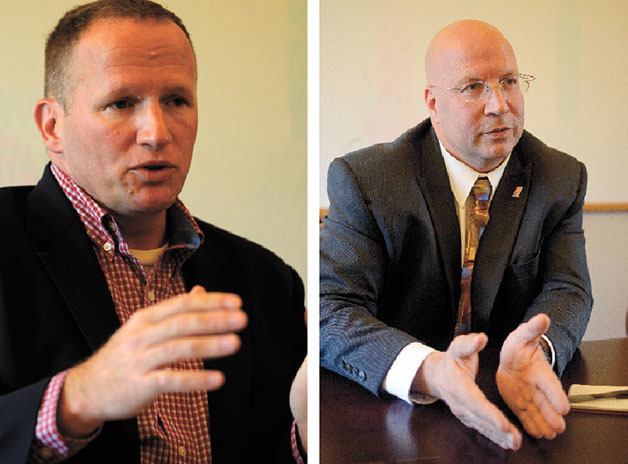
Legislative candidates clash on how to fund the state’s education mandate and how to handle local and state transportation issues.
Republican incumbent Dave Hayes, finishing his first term as District 10 Position 2 representative, said that state Supreme Court’s order to fund education is going to affect every part of the state’s budget in the coming years.
“Obviously coming into compliance with the McCleary decision is going to overshadow just about every other issue in the legislature this year and finding enough money to satisfy the Supreme Court will be a challenge,” Hayes said.
As a member of the education policy committee, Hayes said he plans to look at where the state can eliminate unfunded or underfunded mandates for school districts. In addition, he said the state is spending too much money on testing.
“We have a really big need for reform in that area,” Hayes said.
Democratic challenger Nick Petrish proposes that the government aggressively close tax loopholes and incentives as a way to get businesses to help fund education.
Petrish said under this type of legislation, the state would “clawback” any tax incentives given to businesses if they break promises to keep jobs in state.
Petrish also supports the creation of a state bank, which he said will reduce the cost of financial services and keep interest dollars in house.
While Hayes does not support the legalization of marijuana, he believes that the tax revenues from the new industry should be split between education and local jurisdictions.
“What we can’t do is dedicate 100 percent to the tax revenues solely to education because it’s the local governments… that are going to be impacted the most about the new policy,” Hayes said.
Petrish, a supporter of legalization, suggests splitting the tax money between education and infrastructure, an area he believes the state has been neglecting.
“We need to rebuild our roads and bridges,” Petrish said. “This is fact.”
Petrish also believes the state should fully fund rural transportation such as Island Transit, which has been wracked with financial problems resulting in layoffs and route cuts.
Petrish said it’s the state’s responsibility to make sure these services are available to its constituents, but that the funding needs to be administered with a plan in mind.
Hayes said the state’s role in local transit agencies should be “very small and very narrow.”
“Shifting the focus back over to the state and saying the state needs to come in and support this is not a fair statement,” Hayes said. “Until Island Transit starts charging fares and operating in a more responsible manner, it will be a huge challenge to get additional state dollars.”
Hayes is a supporter of Initiative 591, which would limit the state’s ability to restrict gun ownership to existing federal laws.
The other gun-related legislation, Initiative 594, requiring background checks on all firearm sales and transfers is “misguided,” Hayes said.
“I concentrate on whether the policy is going to address the problem,” Hayes said. “The people who it affects follow the rules already… criminals don’t follow the rules.”
Petrish, a self-proclaimed “shooter” and gun owner, said that I-594 is a “reasonable law.”
“I support I-594 because it’s a gimme,” Petrish said, adding that if it doesn’t pass, gun control advocates are “gonna come at us with more restrictive, more extreme initiatives.”
“By bending a little bit now, we don’t have to break later,” Petrish said.


